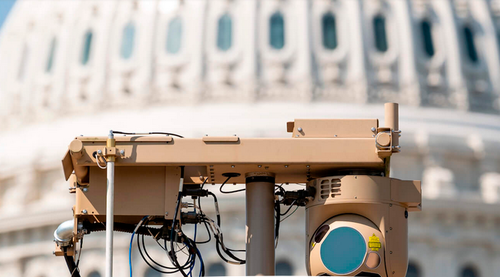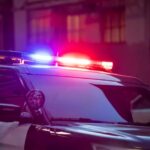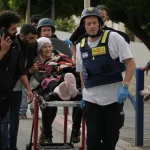
Authored by Julie Kelly via American Greatness,
Tucker Carlson now has the equivalent of nearly five years of surveillance footage captured by U.S. Capitol Police security cameras on January 6, 2021. House Speaker Kevin McCarthy (R-Calif.) turned over the tapes to the Fox News host earlier this month, according to Axios. Carlson’s producers and researchers are already distilling the footage; the first round of clips is expected to air in a few weeks.
While some grumble that McCarthy did not fulfill his promise to publicly release the footage—arguably a valid complaint—Carlson’s team undoubtedly will give the massive trove much-needed context and maximum impact. Carlson released a three-part documentary, “Patriot Purge,” in November 2021 that explained how the events of January 6 helped launch a second “war on terror” against American citizens out of step with the Biden regime.
Since early 2021, Carlson has used his nightly show to expose the cruel treatment of Trump supporters suffering pretrial detention orders; raised questions about the use of undercover assets including FBI informants and the mysterious role of Ray Epps; asked why the case of the January 5 “pipe bomber” remains unsolved; and demanded the release of the surveillance video as late as last month.
Releasing the video never should have been a political fight; after all, the footage was recorded on a taxpayer-paid closed circuit television system installed on public property to monitor public employees. Contrary to arguments by Capitol Police and the Justice Department, the video belongs to the public, not federal agencies.
But both entities, with the help of D.C. District Court judges, have successfully kept the trove largely under wraps for more than two years. Even the FBI and D.C. Metropolitan Police departments signed agreements a few days after the Capitol protest to acknowledge that the tapes technically belonged to Capitol Police.
In a sworn statement filed in March 2021, Thomas DiBiase, general counsel for the Capitol Police, insisted the footage constituted “security information” that required very limited access. “Our concern is that providing unfettered access to hours of extremely sensitive information to defendants who already have shown a desire to interfere with the democratic process will . . . [be] passed on to those who might wish to attack the Capitol again,” DiBiase warned.
The Justice Department subsequently designated the tapes as “highly sensitive” government material subject to protective orders in January 6 prosecutions. It’s been a major battle for defendants and their attorneys to properly access all of the video tied to their cases; defendants cannot watch any clips without the presence of a legal authority and none of the footage can be shared or downloaded.
Of course, there have been some exceptions. Capitol Police shared cherry-picked clips with the House Democrats on the second impeachment committee as well as the January 6 select committee. For example, the brief clip of Senator Josh Hawley (R-Mo.) running through a hallway that afternoon presumably after the breach was produced from surveillance video. HBO also accessed surveillance footage for its slanted documentary on January 6. “Security” concerns, my foot.
Imagine the universal outrage in any other situation had crucial video of what the government considered a terror attack been kept away from the public for more than two years. Influential opinion pages would have banged the drum incessantly for its release, insisting some sort of cover up was unfolding. Progressive activist groups and elected officials would demand a full accounting of what happened before, during, and after the “attack,” including all government-produced evidence. Influential lawyers and legal defense funds would lament the deprivation of due process for those involved in the allegedly heinous act.
Instead, the usual defenders of accountability, transparency, and constitutional rights have been completely AWOL. The fight has been waged by outmatched defense attorneys in the rigged legal and judicial system in the nation’s capital. And a handful of influencers like Carlson.
To be fair, a consortium called the Press Coalition forced a few federal judges to lift protective orders on a small amount of surveillance video. Representing more than a dozen major news companies, the coalition successfully won the release of limited security footage that, in some instances, contradicted the assertion that police did not allow protesters into the building that afternoon. Unsealed video also showed how police brutalized women inside the lower west terrace tunnel.
In a laughable “reality check” in his article, Axios reporter Mike Allen suggested the public has seen enough surveillance video since the “Jan. 6 committee played numerous excerpts of the footage at last year’s captivating hearings.” But not only were most of the evidentiary video clips sourced from protesters’ cell phones, the surveillance video clips offered by the committee represented an infinitesimal sliver of the total collection.
Which, notably, is much bigger than what the government has made available to January 6 defendants. Axios reported that Carlson’s team has 41,000 hours of raw footage—nearly three times the amount that the Justice Department allowed into evidence, which only covered the time period between noon and 8:00 p.m. on January 6. The tapes now in Carlson’s possession apparently covers the entire 24-hour period from “multiple camera angles from all over Capitol grounds.”
One can only guess what the videos will reveal. It’s possible, even likely, the never-before-seen footage will show the elements of a preplanned attack engineered by the same political and government forces that attempted to destroy Donald Trump for the better part of six years. Will the tapes finally answer the questions that top law enforcement officials such as FBI Director Christopher Wray refuse to answer and the January 6 select committee buried—not the least of which was the role of the FBI?
Withholding the video is only one part of the massive cover-up about January 6. Republicans should seek similar demands for records, emails, and communications from Capitol Police to expose the full scope of the cover-up. But like all good political scandals, the path to the truth begins with the tapes.
Authored by Julie Kelly via American Greatness,
Tucker Carlson now has the equivalent of nearly five years of surveillance footage captured by U.S. Capitol Police security cameras on January 6, 2021. House Speaker Kevin McCarthy (R-Calif.) turned over the tapes to the Fox News host earlier this month, according to Axios. Carlson’s producers and researchers are already distilling the footage; the first round of clips is expected to air in a few weeks.
While some grumble that McCarthy did not fulfill his promise to publicly release the footage—arguably a valid complaint—Carlson’s team undoubtedly will give the massive trove much-needed context and maximum impact. Carlson released a three-part documentary, “Patriot Purge,” in November 2021 that explained how the events of January 6 helped launch a second “war on terror” against American citizens out of step with the Biden regime.
Since early 2021, Carlson has used his nightly show to expose the cruel treatment of Trump supporters suffering pretrial detention orders; raised questions about the use of undercover assets including FBI informants and the mysterious role of Ray Epps; asked why the case of the January 5 “pipe bomber” remains unsolved; and demanded the release of the surveillance video as late as last month.
Releasing the video never should have been a political fight; after all, the footage was recorded on a taxpayer-paid closed circuit television system installed on public property to monitor public employees. Contrary to arguments by Capitol Police and the Justice Department, the video belongs to the public, not federal agencies.
But both entities, with the help of D.C. District Court judges, have successfully kept the trove largely under wraps for more than two years. Even the FBI and D.C. Metropolitan Police departments signed agreements a few days after the Capitol protest to acknowledge that the tapes technically belonged to Capitol Police.
In a sworn statement filed in March 2021, Thomas DiBiase, general counsel for the Capitol Police, insisted the footage constituted “security information” that required very limited access. “Our concern is that providing unfettered access to hours of extremely sensitive information to defendants who already have shown a desire to interfere with the democratic process will . . . [be] passed on to those who might wish to attack the Capitol again,” DiBiase warned.
The Justice Department subsequently designated the tapes as “highly sensitive” government material subject to protective orders in January 6 prosecutions. It’s been a major battle for defendants and their attorneys to properly access all of the video tied to their cases; defendants cannot watch any clips without the presence of a legal authority and none of the footage can be shared or downloaded.
Of course, there have been some exceptions. Capitol Police shared cherry-picked clips with the House Democrats on the second impeachment committee as well as the January 6 select committee. For example, the brief clip of Senator Josh Hawley (R-Mo.) running through a hallway that afternoon presumably after the breach was produced from surveillance video. HBO also accessed surveillance footage for its slanted documentary on January 6. “Security” concerns, my foot.
Imagine the universal outrage in any other situation had crucial video of what the government considered a terror attack been kept away from the public for more than two years. Influential opinion pages would have banged the drum incessantly for its release, insisting some sort of cover up was unfolding. Progressive activist groups and elected officials would demand a full accounting of what happened before, during, and after the “attack,” including all government-produced evidence. Influential lawyers and legal defense funds would lament the deprivation of due process for those involved in the allegedly heinous act.
Instead, the usual defenders of accountability, transparency, and constitutional rights have been completely AWOL. The fight has been waged by outmatched defense attorneys in the rigged legal and judicial system in the nation’s capital. And a handful of influencers like Carlson.
To be fair, a consortium called the Press Coalition forced a few federal judges to lift protective orders on a small amount of surveillance video. Representing more than a dozen major news companies, the coalition successfully won the release of limited security footage that, in some instances, contradicted the assertion that police did not allow protesters into the building that afternoon. Unsealed video also showed how police brutalized women inside the lower west terrace tunnel.
In a laughable “reality check” in his article, Axios reporter Mike Allen suggested the public has seen enough surveillance video since the “Jan. 6 committee played numerous excerpts of the footage at last year’s captivating hearings.” But not only were most of the evidentiary video clips sourced from protesters’ cell phones, the surveillance video clips offered by the committee represented an infinitesimal sliver of the total collection.
Which, notably, is much bigger than what the government has made available to January 6 defendants. Axios reported that Carlson’s team has 41,000 hours of raw footage—nearly three times the amount that the Justice Department allowed into evidence, which only covered the time period between noon and 8:00 p.m. on January 6. The tapes now in Carlson’s possession apparently covers the entire 24-hour period from “multiple camera angles from all over Capitol grounds.”
One can only guess what the videos will reveal. It’s possible, even likely, the never-before-seen footage will show the elements of a preplanned attack engineered by the same political and government forces that attempted to destroy Donald Trump for the better part of six years. Will the tapes finally answer the questions that top law enforcement officials such as FBI Director Christopher Wray refuse to answer and the January 6 select committee buried—not the least of which was the role of the FBI?
Withholding the video is only one part of the massive cover-up about January 6. Republicans should seek similar demands for records, emails, and communications from Capitol Police to expose the full scope of the cover-up. But like all good political scandals, the path to the truth begins with the tapes.
Loading…







